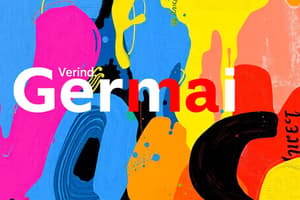Podcast
Questions and Answers
Which term refers to the German Democratic Republic?
Which term refers to the German Democratic Republic?
- Die Republik Deutschland
- Ostdeutschland (correct)
- Die DDR (correct)
- Die Bundesrepublik Deutschland
Which of the following rivers is located in Germany?
Which of the following rivers is located in Germany?
- The Danube
- The Rhine (correct)
- The Seine
- The Thames
What does the term 'Landeshauptstadt' refer to?
What does the term 'Landeshauptstadt' refer to?
- The capital city of a state within Germany (correct)
- A federal state
- A city that is also a state
- A city with a large population
What is the English translation of 'die Einwohnerin'?
What is the English translation of 'die Einwohnerin'?
Which of the following cities is not a city-state in Germany?
Which of the following cities is not a city-state in Germany?
What is the correct way to express the time 1:15 in colloquial terms?
What is the correct way to express the time 1:15 in colloquial terms?
Which of the following represents the official time format for 15:00?
Which of the following represents the official time format for 15:00?
In the expression 'um wie viel Uhr...?', what is the purpose of 'um'?
In the expression 'um wie viel Uhr...?', what is the purpose of 'um'?
What time does Annika have Sport according to her schedule?
What time does Annika have Sport according to her schedule?
How is the time 1:30 commonly expressed in colloquial German?
How is the time 1:30 commonly expressed in colloquial German?
How many countries border Germany?
How many countries border Germany?
Which natural boundary is found in the north of Germany?
Which natural boundary is found in the north of Germany?
What is the population of Berlin?
What is the population of Berlin?
What is the capital of Germany?
What is the capital of Germany?
How many federal states are in the Federal Republic of Germany?
How many federal states are in the Federal Republic of Germany?
What significant event marked the end of the division between East and West Germany?
What significant event marked the end of the division between East and West Germany?
Which of the following cities is also a federal state in Germany?
Which of the following cities is also a federal state in Germany?
Which countries lie to the east of Germany?
Which countries lie to the east of Germany?
What is the purpose of conjugating a verb in a sentence?
What is the purpose of conjugating a verb in a sentence?
Which of the following correctly represents the English infinitive form of the verb 'sehen'?
Which of the following correctly represents the English infinitive form of the verb 'sehen'?
Which sentence correctly uses the verb 'haben' in the first person singular?
Which sentence correctly uses the verb 'haben' in the first person singular?
What is one activity that is commonly enjoyed in German-speaking regions?
What is one activity that is commonly enjoyed in German-speaking regions?
What is the infinitive form of the verb that means 'to come' in German?
What is the infinitive form of the verb that means 'to come' in German?
Which adjective best translates to 'beautiful' in English?
Which adjective best translates to 'beautiful' in English?
Which European country is mentioned to provide a minimum of five weeks of vacation time?
Which European country is mentioned to provide a minimum of five weeks of vacation time?
How would you ask 'What color is it?' in German?
How would you ask 'What color is it?' in German?
How does Germany rank in terms of paid vacation time among industrialized nations?
How does Germany rank in terms of paid vacation time among industrialized nations?
What is the legal minimum vacation time in Canada?
What is the legal minimum vacation time in Canada?
Which of the following adverbs means 'too fast' in English?
Which of the following adverbs means 'too fast' in English?
Which leisure activity is not mentioned as a hobby in the content?
Which leisure activity is not mentioned as a hobby in the content?
In which sentence is the verb 'wissen' used correctly in the first person singular?
In which sentence is the verb 'wissen' used correctly in the first person singular?
What phrase is used to ask if someone else engages in the same activity?
What phrase is used to ask if someone else engages in the same activity?
Compared to the United States, how does vacation time in Germany differ?
Compared to the United States, how does vacation time in Germany differ?
What is a common way to report shared activities among classmates?
What is a common way to report shared activities among classmates?
Flashcards are hidden until you start studying
Study Notes
German Verbs
- Verbs express action, process, or state of being
- The infinitive form of a verb is what appears in vocabulary lists and dictionaries
- The English infinitive is "to" + verb (e.g., "to give", "to see", "to be)
- The German infinitive ends in "-en" or "-n"
- The infinitive needs to be conjugated to agree with the subject
German Adjectives & Adverbs
- Adjectives describe nouns
- Adverbs describe verbs, adjectives, or other adverbs
German Colors
- Colors include: blue, brown, yellow, gray, green, purple, orange, pink, red, black, white
- Use "hell-" for light colors (e.g., "light blue") and "dunkel-" for dark colors (e.g., "dark red")
German Expressions
- "Welche/Welcher/Welches?" - which? (used when asking about a specific item)
- "Welche Farbe hat/haben...?" - what color is/are...?
- "Er/Sie/Es ist..." - he/she/it is...
- "Sie sind..." - they are...
- "Wie viele?" - how many?
- "Wo?" - where?
- "Da ist/sind..." - there is/are...
- "Das ist richtig" - that's right
- "Lass uns gehen!" - Let's go!
- "genau" - exactly
- "in der Nähe" - nearby; near
Germany Geography
- Germany borders nine countries.
- Countries to the east include Poland and the Czech Republic.
- Countries to the west include the Netherlands, Belgium, Luxembourg, and France.
- Austria is located to the south.
- Denmark is located to the north.
- Germany has three natural borders: the North Sea and Baltic Sea to the north, and the Alps to the south.
- Germany has 16 federal states.
- Germany's capital city is Berlin.
- There are three cities in Germany that are also considered federal states: Berlin, Hamburg, and Bremen.
- Germany has four million-plus cities: Berlin, Hamburg, Munich, and Cologne.
- Berlin has 3.7 million inhabitants.
- Germany has a population of 85 million.
- Germany is almost as large as the U.S. state of Montana.
German History
- Germany has always been divided into states, but the map has changed through centuries.
- Germany's history spans nearly 2,000 years.
- Germany did not become a centralized nation until relatively recently.
- Most of the states established today were created after 1945.
- Regional divisions are reflected in local traditions, dialects, and ways of life.
- After World War II, Germany was divided into West Germany (BRD) and East Germany (DDR).
- The Berlin Wall was built in 1961 by the East German government.
- The Berlin Wall was torn down on November 9, 1989.
- The two Germanys were officially reunited on October 3, 1990.
The German Indefinite Article "ein"
- The indefinite article "ein" is equivalent to English "a" or "an".
- "Ein" is used for masculine and neuter nouns.
- "Eine" is used for feminine nouns.
- "Kein", meaning "no", is used when negating a noun.
German Free Time Activities & Hobbies
- Common free time activities and hobbies include: taking photos, playing cards, dancing, hiking, horseback riding, playing soccer, drawing, listening to music, playing guitar, cooking, fishing, visiting friends, and going for walks.
German Leisure Time
- Germans are known for their leisure time.
- Germany ranks high in the industrialized nations in paid vacation time.
- Most full-time employees in Germany enjoy 30 days of paid vacation annually.
- Europeans enjoy folk festivals, regional celebrations, and commemorative events.
Key German Nouns
- "das Bundesland" - federal state
- "der Einwohner" - male inhabitant
- "die Einwohnerin" - female inhabitant
- "der Fluss" - river
- "das Foto" - photo
- "der Fußball" - soccer (soccer ball)
- "die Grenze" - border
- "die Hauptstadt" - capital city
- "die Landeshauptstadt" - state capital
- "der Kaffee" - coffee
- "das Konzert" - concert
- "das Land" - country/land
- "das Meer" - sea
- "die Million" - million
- "die Millionenstadt" - city with a population over 1 million
- "die Stadt" - city/town
- "der Stadtstaat" - a city that is also simultaneously a state
Verb "gehen"
- "gehen" can be combined with another infinitive to mean "to go (do something)".
- "gehen" is conjugated in the sentence, and the other verb appears at the end of the sentence in its unconjugated infinitive form.
German Time
- The 24-hour clock (0.00 to 23.59) is used for official times.
- The 24-hour clock format is "[hour] Uhr [minutes past the hour]".
- The word "eins" loses it -s ending when used with "Uhr"
- Other numbers remain unchanged.
German Course Schedule
- "Welche Kurse hast du dieses Semester?" - What courses do you have this semester?
- "Um wie viel Uhr beginnt dein erster Kurs am Montag?" - At what time does your first class start on Monday?
- "Um wie viel Uhr beginnt dein erster Kurs am Dienstag?" - At what time does your first class start on Tuesday?
- "Um wie viel Uhr endet dein letzter Kurs am Freitag?" - At what time does your last class end on Friday?
- "Wann beginnt der Deutschkurs? Wann ist Deutsch zu Ende?" - When does the German class start? When does it end?
- "Hast du am Mittwochnachmittag einen Kurs? Wenn ja, welchen? Und um wie viel Uhr?" - Do you have a class on Wednesday afternoon? If so, which one? And at what time?
"Um" in German
- Use the preposition "um" with a clock time to specify at what time something occurs.
- "Um wie viel Uhr...?" - At what time...?
Studying That Suits You
Use AI to generate personalized quizzes and flashcards to suit your learning preferences.




